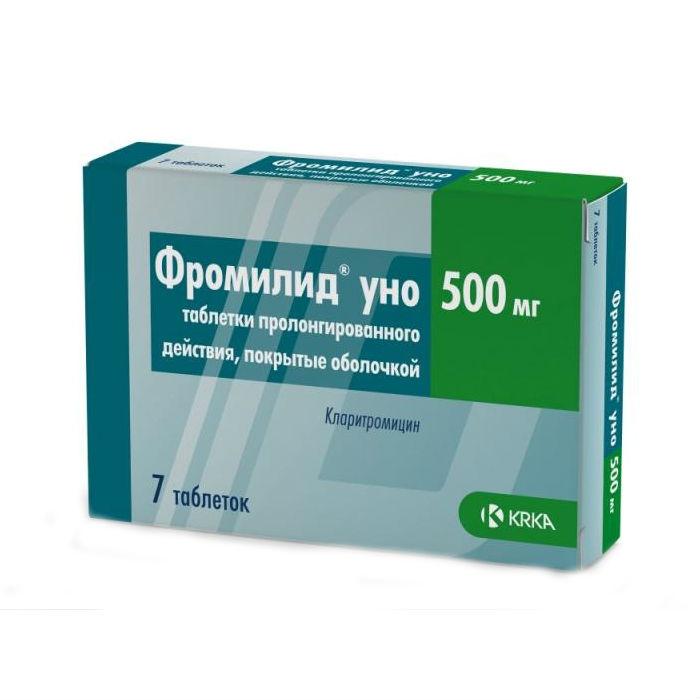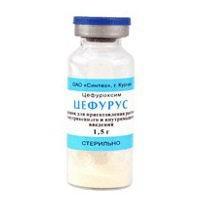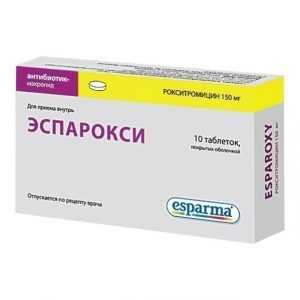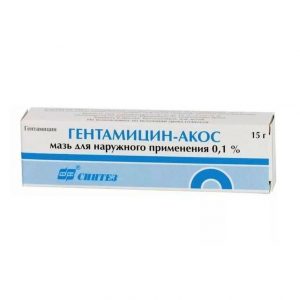Description
Release form
Long-acting film-coated tablets.
Packing
7 pcs.
Pharmacological action
Fromilid Uno is a semi-synthetic antibiotic from the macrolide group. It inhibits protein synthesis in a microbial cell, has a bacteriostatic (mainly) and bactericidal effect.
Indications
Upper respiratory tract infections including: tonsillopharyngitis, acute sinusitis.
Otitis media.
Lower respiratory tract infections.
Infections of the skin and soft tissues.
Infections caused by mycobacteria including: Mycobacterium avium complex, Mycobacterium kansasii, Mycobacterium mannum, Mycobacterium leprae.
Other infectious and inflammatory diseases caused by drug-sensitive microorganisms.
Eradication of Helicobacter pylori and a decrease in the frequency of relapse of a duodenal ulcer (as part of combination therapy).
Contraindications
Severe liver failure.
Hepatitis (history).
porphyria.
I trimester of pregnancy.
Lactation.
Concomitant use with terfenadine, cisapride, pimozide or astemizole.
Hypersensitivity to clarithromycin or other macrolide antibiotics.
Use during pregnancy and lactation
The use of the drug in the first trimester of pregnancy is contraindicated. The use of the drug in the II and III trimesters of pregnancy is possible only if the intended benefit to the mother outweighs the potential risk to the fetus. Clarithromycin is excreted in breast milk, so if you need to use the drug during lactation, breastfeeding should be discontinued.
Special instructions
Fromilid Uno should be used with caution against the background of drugs metabolized by the liver (it is recommended to measure their concentration in the blood).
When used concomitantly with warfarin or other indirect anticoagulants, prothrombin time must be monitored.
Attention should be paid to the possibility of cross-resistance between clarithromycin and other macrolide antibiotics, as well as lincomycin and clindamycin.
In severe persistent diarrhea, which may indicate pseudomembranous colitis, you should stop taking the drug and consult your doctor.
Composition of
1 tablet contains:
Active ingredient:
Clarithromycin 500 mg.
Excipients:
Sodium alginate
Calcium sodium alginate
Lactose monohydrate
Povidone
Polysorbate 80
Silicon dioxide anhydrous
Magnesium stearate
Talc
Hyproldehyde sintolrd1 (ylproldehyde 1) ylproldehyde (1)
Dosage and administration of
Tablets should be taken with meals: swallow whole, with a small amount of liquid, do not break. Adults and children over the age of 12 years are prescribed 500 mg / day (1 tablet). For the treatment of severe infections, the daily dose is increased to 1000 mg / day (2 tablets). The duration of treatment is usually 7-14 days.
Side effects
From the digestive system: nausea, vomiting, diarrhea (with severe and persistent diarrhea, which may be a consequence of pseudomembranous colitis, the drug should be canceled), pain in the abdomen, stomatitis, glossitis, a transient change in taste sensations is very rare – increased activity of liver enzymes, cholestatic jaundice.
From the side of the central nervous system and peripheral nervous system: headache in some cases – dizziness, confusion, fear, insomnia, nightmares.
From the cardiovascular system: very rarely – lengthening of the QT interval, ventricular arrhythmia (including ventricular paroxysmal tachycardia, flutter or ventricular fibrillation).
Allergic reactions: hypersensitivity reactions (including urticaria, anaphylaxis) are very rare – Stevens-Johnson syndrome.
Most patients have low-intensity side effects. In case of side effects, consult your doctor.
Drug Interactions
Clarithromycin is metabolized in the liver, where it can inhibit the action of isoenzymes of the cytochrome P450 system. With the simultaneous use of clarithromycin with drugs metabolized by the cytochrome P450 system, concentrations of the latter can increase and cause side effects. Therefore, terfenadine, cisapride, pimozide and astemizole should not be used during treatment with clarithromycin because of the threat of life-threatening arrhythmias.
Prothrombin time should be periodically monitored in patients receiving clarithromycin concomitantly with warfarin or other oral anticoagulants.
The simultaneous use of clarithromycin and zidovudine reduces the absorption of zidovudine.
The simultaneous use of clarithromycin and ritonavir leads to a significant increase in the level of clarithromycin in serum and a significant decrease in the level of its metabolite in serum.
Overdose
Symptoms: nausea, vomiting, diarrhea, headache, confusion.
Treatment: Wash your stomach immediately. Symptomatic treatment. Hemodialysis and peritoneal dialysis do not lead to a significant change in serum clarithromycin levels.
Storage Conditions
Store in a cool cool place.
active substance
Clarithromycin
Terms leave through pharmacies
In retseptu
Dosage form
tablet prolong.
Prescription
For children over 12 years old, As prescribed by a doctor, Pregnant as prescribed by a doctor, Adults as prescribed NIJ doctor
Indications
Indications
From pharyngitis, From respiratory infections, From sinusitis, From otitis media, From sore throat, From tonsillitis, From gastrointestinal infections caused by Helicobacter pylori, Colds, From gastric and duodenal ulcers, From boils, From skin infections, Bronchitis
KRKA d.d. Novo mesto AO, Slovenia




